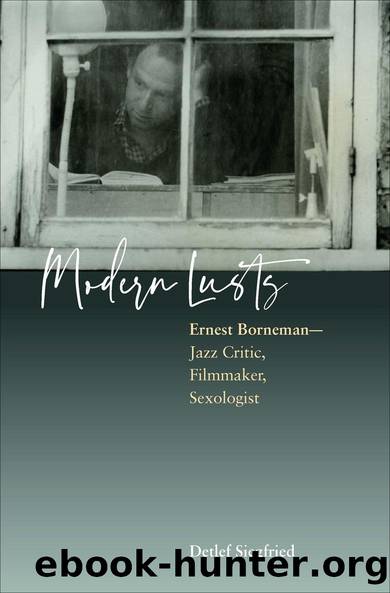Modern Desires by Detlef Siegfried

Author:Detlef Siegfried [Siegfried, Detlef]
Language: eng
Format: epub
ISBN: 9781789202885
Barnesnoble:
Publisher: Berghahn Books, Incorporated
Published: 2020-07-01T00:00:00+00:00
Entertainment or Information?
Even at its founding, the twin goals set for Freies Fernsehen paired better in theory than praxis. Industry, which was in search of an advertising platform, was interested in achieving the greatest possible resonance among viewers, and this meant entertainment. On the other side there were the federal governmentâs political aims, which could only be accomplished if the share of informative programming were relatively high. Borneman focused chiefly on entertainment, seeking first to lessen the pedantic tone of top-down political messaging that still largely characterized German television, and second to gain the upper hand on the competition within public service broadcasting via entertainmentâs draw. In contrast to his later self-depiction as a sort of leftist television guerilla, Borneman was hardly able to achieve anything regarding the content of informational and documentary programming given the set political guidelines, and turned his critique instead to formal aspects, which in his view should at least be more entertaining than the competitionâs. This view set him diametrically opposite the chief editor Konrad Kraemer, to whom the responsibility for this aspect of programming fell. After his stint at the FFG, Kraemer, a âhighly dutiful Catholicâ and CDU man from Münster, went on to be the editor in chief at the Catholic News Agency (Katholische Nachrichten Agentur). Entirely in keeping with the prevailing view among most journalists during the Adenauer era, he professed a faith in balance and monotony, not opinion and commentary. âI am concerned with objectivity and truth, even at the risk of coming across as boring. For me, sensation isnât something for the screen.â385 It was no surprise that Borneman made little of Kraemerâs ideas for programming, which featured titles like âRoundtable Bonnâ (Bonner Stammtisch) and âFor Our Guestâ (Bei uns zu Gast), but also the somewhat more daring âCrossfireâ (Im Kreuzfeuer)âall of which seemed âidentical and equally boringâ to Borneman. The shows were too uncritical, but most importantly they were unfit for television in their formal conception and took too much of a journalistic tack, making them âtranslations of newspaper articles into television programs.â386 For political programming he recommended that Kraemerâs department develop âa program like the English Panorama,â which âhas three or four camera teams filming and presents the weekâs events in real living color, rather than having four or five newscasters sitting still in a room talking themselves to death.â In similar fashion, by the early 1960s Borneman anticipated the trend toward entertainment news that would first break through in West Germany in the 1980s.
As the future program began to take shape in the fall of 1960, a conflict thus arose between Borneman and Kraemer regarding the proper proportions of the two types of programming when a coworker presented a comparison of ARD and Freies Fernsehen. While only 24.3 percent of the ARDâs broadcasts were informational or documentary in nature, Freies Fernsehen had plans for 36 percent. The percentage was much too high for Borneman, who thought Kraemer should reduce it to 20 percent or at maximum 25 percent, as with English stations, although this too was on the rise.
Download
This site does not store any files on its server. We only index and link to content provided by other sites. Please contact the content providers to delete copyright contents if any and email us, we'll remove relevant links or contents immediately.
Cecilia; Or, Memoirs of an Heiress — Volume 1 by Fanny Burney(32527)
Cecilia; Or, Memoirs of an Heiress — Volume 2 by Fanny Burney(31928)
Cecilia; Or, Memoirs of an Heiress — Volume 3 by Fanny Burney(31916)
The Lost Art of Listening by Michael P. Nichols(7480)
Asking the Right Questions: A Guide to Critical Thinking by M. Neil Browne & Stuart M. Keeley(5741)
We Need to Talk by Celeste Headlee(5597)
On Writing A Memoir of the Craft by Stephen King(4920)
Dialogue by Robert McKee(4375)
Pre-Suasion: A Revolutionary Way to Influence and Persuade by Robert Cialdini(4196)
I Have Something to Say: Mastering the Art of Public Speaking in an Age of Disconnection by John Bowe(3864)
Elements of Style 2017 by Richard De A'Morelli(3331)
The Book of Human Emotions by Tiffany Watt Smith(3282)
Fluent Forever: How to Learn Any Language Fast and Never Forget It by Gabriel Wyner(3067)
Name Book, The: Over 10,000 Names--Their Meanings, Origins, and Spiritual Significance by Astoria Dorothy(2962)
Why I Write by George Orwell(2933)
Good Humor, Bad Taste: A Sociology of the Joke by Kuipers Giselinde(2931)
The Art Of Deception by Kevin Mitnick(2782)
The Grammaring Guide to English Grammar with Exercises by Péter Simon(2728)
Ancient Worlds by Michael Scott(2661)
